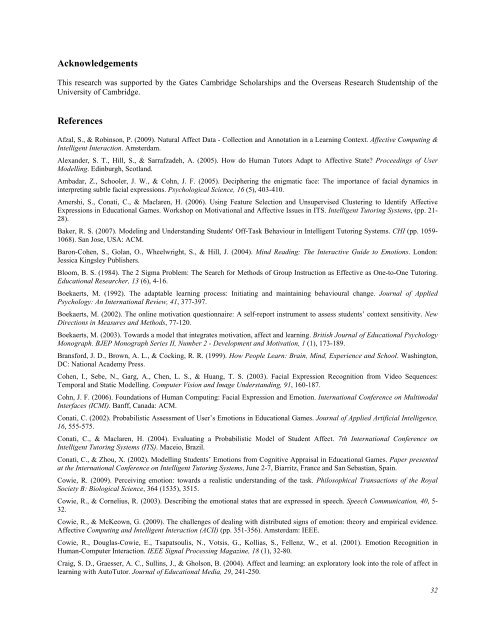October 2011 Volume 14 Number 4 - Educational Technology ...
October 2011 Volume 14 Number 4 - Educational Technology ...
October 2011 Volume 14 Number 4 - Educational Technology ...
You also want an ePaper? Increase the reach of your titles
YUMPU automatically turns print PDFs into web optimized ePapers that Google loves.
Acknowledgements<br />
This research was supported by the Gates Cambridge Scholarships and the Overseas Research Studentship of the<br />
University of Cambridge.<br />
References<br />
Afzal, S., & Robinson, P. (2009). Natural Affect Data - Collection and Annotation in a Learning Context. Affective Computing &<br />
Intelligent Interaction. Amsterdam.<br />
Alexander, S. T., Hill, S., & Sarrafzadeh, A. (2005). How do Human Tutors Adapt to Affective State? Proceedings of User<br />
Modelling. Edinburgh, Scotland.<br />
Ambadar, Z., Schooler, J. W., & Cohn, J. F. (2005). Deciphering the enigmatic face: The importance of facial dynamics in<br />
interpreting subtle facial expressions. Psychological Science, 16 (5), 403-410.<br />
Amershi, S., Conati, C., & Maclaren, H. (2006). Using Feature Selection and Unsupervised Clustering to Identify Affective<br />
Expressions in <strong>Educational</strong> Games. Workshop on Motivational and Affective Issues in ITS. Intelligent Tutoring Systems, (pp. 21-<br />
28).<br />
Baker, R. S. (2007). Modeling and Understanding Students' Off-Task Behaviour in Intelligent Tutoring Systems. CHI (pp. 1059-<br />
1068). San Jose, USA: ACM.<br />
Baron-Cohen, S., Golan, O., Wheelwright, S., & Hill, J. (2004). Mind Reading: The Interactive Guide to Emotions. London:<br />
Jessica Kingsley Publishers.<br />
Bloom, B. S. (1984). The 2 Sigma Problem: The Search for Methods of Group Instruction as Effective as One-to-One Tutoring.<br />
<strong>Educational</strong> Researcher, 13 (6), 4-16.<br />
Boekaerts, M. (1992). The adaptable learning process: Initiating and maintaining behavioural change. Journal of Applied<br />
Psychology: An International Review, 41, 377-397.<br />
Boekaerts, M. (2002). The online motivation questionnaire: A self-report instrument to assess students’ context sensitivity. New<br />
Directions in Measures and Methods, 77-120.<br />
Boekaerts, M. (2003). Towards a model that integrates motivation, affect and learning. British Journal of <strong>Educational</strong> Psychology<br />
Monograph. BJEP Monograph Series II, <strong>Number</strong> 2 - Development and Motivation, 1 (1), 173-189.<br />
Bransford, J. D., Brown, A. L., & Cocking, R. R. (1999). How People Learn: Brain, Mind, Experience and School. Washington,<br />
DC: National Academy Press.<br />
Cohen, I., Sebe, N., Garg, A., Chen, L. S., & Huang, T. S. (2003). Facial Expression Recognition from Video Sequences:<br />
Temporal and Static Modelling. Computer Vision and Image Understanding, 91, 160-187.<br />
Cohn, J. F. (2006). Foundations of Human Computing: Facial Expression and Emotion. International Conference on Multimodal<br />
Interfaces (ICMI). Banff, Canada: ACM.<br />
Conati, C. (2002). Probabilistic Assessment of User’s Emotions in <strong>Educational</strong> Games. Journal of Applied Artificial Intelligence,<br />
16, 555-575.<br />
Conati, C., & Maclaren, H. (2004). Evaluating a Probabilistic Model of Student Affect. 7th International Conference on<br />
Intelligent Tutoring Systems (ITS). Maceio, Brazil.<br />
Conati, C., & Zhou, X. (2002). Modelling Students’ Emotions from Cognitive Appraisal in <strong>Educational</strong> Games. Paper presented<br />
at the International Conference on Intelligent Tutoring Systems, June 2-7, Biarritz, France and San Sebastian, Spain.<br />
Cowie, R. (2009). Perceiving emotion: towards a realistic understanding of the task. Philosophical Transactions of the Royal<br />
Society B: Biological Science, 364 (1535), 3515.<br />
Cowie, R., & Cornelius, R. (2003). Describing the emotional states that are expressed in speech. Speech Communication, 40, 5-<br />
32.<br />
Cowie, R., & McKeown, G. (2009). The challenges of dealing with distributed signs of emotion: theory and empirical evidence.<br />
Affective Computing and Intelligent Interaction (ACII) (pp. 351-356). Amsterdam: IEEE.<br />
Cowie, R., Douglas-Cowie, E., Tsapatsoulis, N., Votsis, G., Kollias, S., Fellenz, W., et al. (2001). Emotion Recognition in<br />
Human-Computer Interaction. IEEE Signal Processing Magazine, 18 (1), 32-80.<br />
Craig, S. D., Graesser, A. C., Sullins, J., & Gholson, B. (2004). Affect and learning: an exploratory look into the role of affect in<br />
learning with AutoTutor. Journal of <strong>Educational</strong> Media, 29, 241-250.<br />
32

















